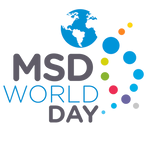MSD World Day Date in the current year: July 30, 2026
 MSD World Day is an annual awareness campaign held on July 30. It was created to raise awareness of multiple sulfatase deficiency, a rare genetic disorder belonging to a group of metabolic disorders called lysosomal storage diseases.
MSD World Day is an annual awareness campaign held on July 30. It was created to raise awareness of multiple sulfatase deficiency, a rare genetic disorder belonging to a group of metabolic disorders called lysosomal storage diseases.Lysosomes are organelles found in all mammalian cells except erythrocytes, or red blood cells. With the help of special enzymes, they break down and recycle cellular waste and pathogens into their building-block molecules. However, if one of these enzymes is defective, the large molecules that are supposed to be broken down by lysosomes accumulate in cells and eventually kill them.
Lysosomal storage diseases are caused by genetic mutations that affect enzymes necessary for lysosomes to function properly. For example, multiple sulfatase deficiency (MSD), also known as Austin disease or mucosulfatidosis, is caused by a mutation in the SUMF11 gene that renders the formylglycine-generating enzyme (FGE) defective. FDE activates the sulfatase enzymes that break down sulfate esters.
MSD is ultra-rare because of its autosomal recessive inheritance pattern. This means that for a child to develop symptoms, both parents must be carriers of the mutation. Even then, there is a one in four chance that their child will have the disorder. As of 2024, fewer than 100 cases of MSD have been reported worldwide. However, the disease is believed to be underdiagnosed due to its rarity.
MSD-causing mutations lead to the accumulation of glycosaminoglycans (mucopolysaccharides) and sulfolipids in cells, resulting in a wide range of symptoms. Early symptoms of MSD usually appear between one and two years of age. These symptoms include increased muscle tone, coarse facial features, difficulty eating and/or swallowing, neurological issues, sleep disturbances, balance problems, recurrent ear and/or sinus infections, seizures, failure to meet developmental milestones, and dry skin. Other symptoms include an enlarged liver and spleen, skeletal abnormalities, intestinal hernias, and hydrocephalus, which is a buildup of fluid in the brain.
MSD is a progressive disease that causes extensive neurological damage and severe intellectual disability. Children with MSD eventually require constant, full-time care and have a significantly reduced life expectancy. Most children die before the age of 10, usually due to progressive neurological decline or respiratory complications.
There is no cure for MSD. Management of the disease is largely based on the symptoms and usually requires a multidisciplinary team, depending on which organs and body systems are affected. Specialists whose consultations may be required include cardiologists, dentists, dermatologists, endocrinologists, gastroenterologists, hematologists, neurologists, nutritionists, ophthalmologists, orthopedists, pediatricians, psychiatrists, pulmonologists, and urologists.
MSD World Day was created by a group of MSD foundations in Argentina, Ireland, Spain, and the United States. They organize various events and activities that include fundraisers to support families affected by MSD and fund research, illuminations of buildings and landmarks, social media campaigns, and more.
- Category
- International Observances
- Tags
- MSD World Day, international observances, awareness days, multiple sulfatase deficiency, rare diseases